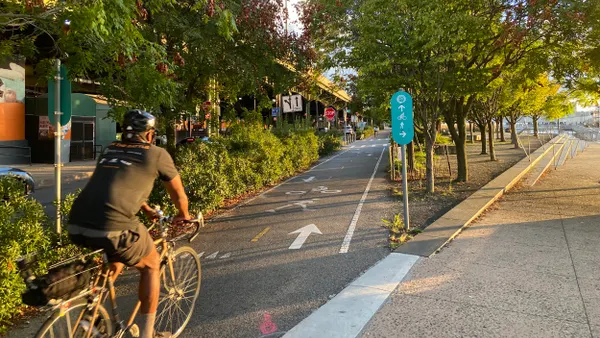Dive Brief:
- Widespread adoption of electric vehicles will happen within the next decade, experts say, and there is growing pressure on states to ensure they develop sufficient charging infrastructure to accommodate the transition.
- Washington is now considering legislation to ban the sale of internal combustion light duty vehicles by 2030, and three other states led by California have announced 2035 targets. Experts at Edmunds, an online auto resource, say 2021 could be a "pivotal year for growth" in the EV sector, and GM has announced plans to sell only zero-emissions cars within the next 15 years.
- Two new reports this week conclude California is farthest along in developing policies to support transportation electrification. Research from Plug in America and the American Council for an Energy Efficient Economy highlights the broad range of policy options state regulators and lawmakers can utilize to smooth the adoption of emissions-free vehicles.
Dive Insight:
States, automakers and the federal government are increasingly committed to electrifying the transportation sector, but that can't happen without effective policies to enable charging infrastructure and a stronger electric grid, say experts.
"A goal with no policy is not going to get you there," said Joel Levin, executive director for Plug in America.
Edmunds anticipates 2021 EV sales will make up 2.5% of new car purchases — up from 1.9% of sales last year. The firm says about 30 EVs from 21 brands will be available for sale this year, compared to 17 vehicles from 12 brands in 2020.
"After years of speculation and empty promises, 2021 is actually shaping up to be a pivotal year for growth in the EV sector," Jessica Caldwell, Edmunds' executive director of insights, said in a statement.
But to fully embrace the potential energy, climate and financial benefits of electrified transportation, experts say states must move quickly to encourage adoption.
"States in general are at very different levels of their transportation electrification journeys," said Shruti Vaidyanathan, transportation program director at ACEEE and co-author of its new report.
Both ACEEE and Plug in America have completed new papers ranking state policy efforts on EVs, as well as outlining approaches for those states only now beginning to consider EV policy.
Plug in America's report identifies vehicle rebates, tax credits and sales tax exemptions as among the most "common and effective" policies to boost EV sales.
"The amount of the rebate matters. We regard $1,500 as the minimum necessary to make a significant impact on a purchasing decision," the Plug in America report noted.
ACEEE identified foundational policy steps for states early on in the EV process, including for state agencies and utilities to "begin with equity in mind."
ACEEE called for policies that "incorporate spending carve-outs or funding adders for low-income, economically distressed, and EJ communities in state and utility EV planning to ensure that the benefits of transportation electrification are distributed equitably."
Vaidyanathan said states need to set targets for EV deployment, which acts as a kind of "umbrella policy" for transportation electrification. After that, she said the use of EV purchase incentives and policies to support charging infrastructure are necessary.
"What this report is really trying to do, is offer some policy options for states that aren't really thinking about their EV priorities," she said.
After California, Plug in America identified Massachusetts, Oregon, New Jersey, Colorado, New York, Vermont, Connecticut, Maine and Washington as leaders on EV policy. ACEEE's top-10 were rounded out by New York, the District of Columbia, Maryland, Massachusetts, Washington, Vermont, Colorado, Oregon and New Jersey.
States considering internal combustion engine (ICE) phaseouts were all included among leading states.
New Jersey and Massachusetts have each signaled they will follow California's lead in banning the sale of ICE vehicles after 2035. Washington Rep. Nicole Macri, D, has introduced legislation to set a 2030 deadline to phase out light-duty gas vehicles in her state.
"There's really not a reason we can't do it in 2030," said Matthew Metz, founder and co-executive director of Coltura, a Seattle-based transportation nonprofit that helped draft the Macri legislation.
"It's not that there is a missing factor that will only be available in 2035," said Metz. "It was mainly a political calculation. ... 2030 is just as feasible as 2035, provided we get started now.
Plug in America supports the Washington legislation, Levin said. "It's ambitious," he said. "Probably what's on the edge of achievable."
GM's recent commitment to the EV market is "huge" and will help accelerate adoption, Levin said. "I'm sure all the other U.S. automakers are scratching their heads right now and figuring out how to respond," he said, adding that more announcements may be on the way.
President Joe Biden has also called to transition the federal government's vehicle fleet to all-electric, a move that has spurred optimism within the EV sector.
Whether the target for transitioning to all new EV sales is 2030 or 2035, "I think that if states can really ramp up the policies they're putting in place there's no reason those targets can't be achieved," said Vaidyanathan. "It's ambitious ... but making the transition to transportation electrification is the right one. There are a number of policy levers states have available to them, to really ramp up."











